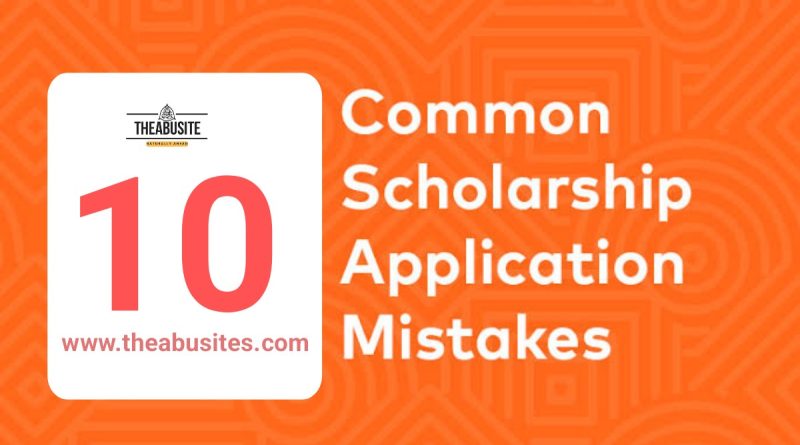Top 10 Common Scholarship Application Mistakes That Can Ruin Your Scholarship in 2024
Securing a Scholarships can be a life-changing opportunity for students to pursue their education and achieve their dreams. In today’s fast-paced world, where the cost of education is skyrocketing, securing a scholarship is more important now than ever before. However, with so many people applying for scholarships, competition is fierce.
The smallest mistake in your application can cost you the funding you need. In this blog post, we will discuss the 10 most common scholarship application mistakes that students make, and how you can avoid them. By following our tips, you can ensure that your application stands out and increases your chances of securing funding for your education. Let’s dive in!
The importance of scholarships

Scholarships play a vital role in helping students achieve their educational dreams by providing financial support and opportunities. They not only alleviate the burden of hefty tuition fees but also open doors to a world of possibilities. However, securing a scholarship is not a walk in the park. It requires careful planning, dedication, and avoiding common mistakes that can jeopardize your chances of success.
Scholarships are more than just a financial lifeline; they are a recognition of your achievements, potential, and aspirations. They are awarded based on academic excellence, extracurricular involvement, leadership qualities, and other outstanding attributes. Scholarships can open doors to prestigious institutions, enable you to pursue your desired field of study, and provide valuable networking opportunities.
However, despite the numerous benefits scholarships offer, many applicants unknowingly make mistakes that hinder their chances of success. These mistakes can range from minor errors in the application form to overlooking crucial requirements or failing to highlight their unique qualities effectively.
By familiarizing yourself with these common mistakes, you can ensure that your scholarship application stands out from the crowd and increases your chances of securing the funding you need to pursue your educational goals.
In the following sections, we will explore these ten common scholarship application mistakes in detail, providing valuable insights and practical tips to help you avoid them. So, let’s dive in and equip you with the knowledge to navigate the scholarship application process successfully!
List of 10 common Scholarship Application Mistakes
Mistake #1: Missing the application deadline
Missing the application deadline is perhaps one of the most common and detrimental mistakes that students make when applying for scholarships. It’s crucial to understand that scholarship committees receive numerous applications and adhere to strict timelines. By missing the deadline, you automatically disqualify yourself from consideration, regardless of how qualified or deserving you may be.
To avoid this mistake, it is essential to stay organized and keep track of all the deadlines for scholarships you are interested in. Create a calendar or use a planner to mark down the application deadlines, ensuring that you have enough time to gather all the necessary documents and complete the application process.
To further prevent missing deadlines, it is advisable to start your scholarship search and application process well in advance. Waiting until the last minute not only adds unnecessary stress but also increases the chances of overlooking important submission dates.
Additionally, it is crucial to thoroughly read and understand the application requirements and instructions. Some scholarships may have specific submission methods, such as online forms or physical copies, while others may require additional documents like recommendation letters or transcripts. By carefully reviewing the application guidelines, you can plan accordingly and allocate sufficient time to complete each step of the process.
Remember, missing a scholarship deadline can be a costly mistake. It is vital to prioritize organization, diligence, and time management to ensure you submit your applications on time and give yourself the best chance to secure the funding you need for your education.
Mistake #2: Failing to fully understand the eligibility criteria
When it comes to applying for scholarships, one of the biggest mistakes you can make is failing to fully understand the eligibility criteria. Many students make the assumption that they meet the requirements based on a quick glance at the scholarship description, only to realize later that they are not eligible.
To avoid this costly mistake, take the time to carefully read and understand all the eligibility criteria before you start the application process. Pay attention to factors such as academic requirements, field of study, nationality, age, and any other specific criteria mentioned.
Make sure to thoroughly research the scholarship provider and their requirements. Look for any additional documentation or supporting materials that may be required, such as recommendation letters, essays, or transcripts. Keep in mind that some scholarships may have specific requirements related to community service, leadership roles, or extracurricular activities.
If you have any doubts or questions regarding the eligibility criteria, don’t hesitate to reach out to the scholarship provider for clarification. It’s better to seek clarification beforehand rather than wasting time and effort on an application that will ultimately be rejected.
By thoroughly understanding the eligibility criteria, you can ensure that you are applying for scholarships that you are truly eligible for. This will increase your chances of securing the funding you need to further your education and achieve your academic goals. So, take the time to do your research and avoid this common scholarship application mistake.
Mistake #3: Submitting a generic application without tailoring it to the specific scholarship
One of the biggest mistakes that scholarship applicants often make is submitting a generic application without tailoring it to the specific scholarship they are applying for. It may be tempting to save time and effort by using the same application for multiple scholarships, but this approach can significantly decrease your chances of securing funding.

Scholarship committees are looking for candidates who demonstrate a genuine interest and passion for the scholarship’s specific criteria and objectives. By submitting a generic application, you miss out on the opportunity to showcase how your skills, experiences, and goals align with what the scholarship program aims to achieve.
To avoid this mistake, take the time to thoroughly research each scholarship you are applying for. Understand the organization’s mission, values, and any specific requirements they have outlined. Tailor your application materials, including your essays, letters of recommendation, and personal statements, to highlight how you meet those specific criteria.
Show the scholarship committee that you have done your homework and that you are genuinely interested in their program. Use language that reflects your understanding of their goals and demonstrate how your unique qualities and experiences make you an ideal candidate.
Remember, scholarship providers receive numerous applications, and they are looking for exceptional individuals who stand out from the crowd. By customizing your application to each scholarship, you show that you are serious about the opportunity and increase your chances of securing the funding you need to pursue your education or career goals.
Mistake #4: Neglecting to provide necessary supporting documents
When it comes to applying for scholarships, providing the necessary supporting documents is crucial. Many applicants make the mistake of neglecting this aspect, which can significantly impact their chances of securing funding.
Scholarship committees typically require applicants to submit various supporting documents, such as academic transcripts, recommendation letters, resumes, and personal statements.
These documents provide a more comprehensive view of the applicant’s qualifications, achievements, and aspirations. Neglecting to include these documents or submitting incomplete or inaccurate information can convey a lack of attention to detail or a lack of commitment to the scholarship opportunity.
To avoid this mistake, it is essential to carefully review the application requirements and ensure that all necessary supporting documents are prepared and included with your application. Take the time to gather your academic records, secure strong letters of recommendation, and craft a compelling personal statement that highlights your unique qualities and accomplishments.
Pay attention to any specific formatting or submission guidelines provided by the scholarship committee. Keep in mind that these supporting documents serve as a way for the scholarship committee to evaluate your eligibility and fit for the scholarship. By neglecting to provide them or providing incomplete or subpar documents, you are essentially undermining your own chances of securing the funding you need.
Take the necessary steps to gather and prepare these supporting documents early on in the application process, allowing yourself ample time to review and ensure that everything is in order. This attention to detail and thoroughness will demonstrate your commitment and professionalism to the scholarship committee, increasing your chances of success.
Remember, scholarships are highly competitive, and even the smallest oversight can potentially cost you the funding you deserve. So, don’t underestimate the importance of providing the necessary supporting documents – they can make or break your scholarship application.
Mistake #5: Overlooking the importance of a strong personal statement or essay
When it comes to applying for scholarships, many students tend to overlook the significance of a compelling personal statement or essay. They may focus more on meeting the eligibility criteria and collecting supporting documents, neglecting the opportunity to showcase their unique qualities, experiences, and aspirations.
A strong personal statement or essay is a crucial component of a scholarship application. It allows you to present yourself as a well-rounded individual with a genuine passion for your chosen field of study or a compelling story that sets you apart from other applicants.
One common mistake is using generic or cliché language in your personal statement. Admissions committees read countless essays, so it’s essential to make yours stand out. Avoid using overly formal language or relying on empty buzzwords. Instead, be authentic and use your own voice to express your thoughts and experiences.
Another mistake is failing to address the specific prompt or guidelines provided by the scholarship committee. Each scholarship may have different requirements, and tailoring your essay accordingly demonstrates your attention to detail and dedication to the application process.
Additionally, don’t shy away from sharing personal anecdotes or challenges you have overcome. These stories can provide insight into your character, resilience, and determination, making a lasting impression on the readers.
Lastly, don’t rush the writing process. Take the time to brainstorm ideas, create an outline, and revise your essay multiple times. Seek feedback from teachers, mentors, or friends to ensure your essay is clear, concise, and impactful.
By avoiding the mistake of overlooking the importance of a strong personal statement or essay, you can significantly increase your chances of securing the scholarship funding you need to pursue your educational goals.
Mistake #6: Forgetting to proofread and edit your application materials
When it comes to scholarship applications, attention to detail is crucial. One common mistake that applicants often make is forgetting to proofread and edit their application materials before submitting them. It may seem like a small oversight, but it can have a significant impact on your chances of securing funding.
Imagine this scenario: you’ve spent hours crafting a compelling essay, highlighting your achievements and aspirations. You feel confident about the content and message you’ve conveyed. However, upon closer inspection, you realize that there are grammatical errors, typos, and awkward phrasing throughout the essay. These mistakes can detract from the overall quality of your application and leave a negative impression on the scholarship committee.
Proofreading and editing your application materials should be a non-negotiable step in your scholarship application process. It allows you to catch and correct any errors or inconsistencies, ensuring that your application is polished and professional.
Start by reviewing your essays and personal statements for grammar, spelling, and punctuation errors. Use online tools such as grammar checkers or ask a trusted friend or family member to proofread your work. Look for clarity and coherence in your writing, making sure that your ideas flow smoothly and effectively.
Additionally, pay attention to the formatting and presentation of your application materials. Ensure that your documents are well-organized, with clear headings and sections. Double-check that you have included all the necessary information and supporting documents requested by the scholarship program.
By taking the time to proofread and edit your application materials, you demonstrate your commitment to excellence and attention to detail. This extra effort can set you apart from other applicants and increase your chances of securing the scholarship funding you need to pursue your educational goals. Remember, the little things matter, so don’t underestimate the power of a well-polished application.
Mistake #7: Not highlighting your achievements and extracurricular activities
When it comes to applying for scholarships, it’s essential to showcase your achievements and extracurricular activities. Many students make the mistake of only focusing on their academic accomplishments, forgetting that scholarship committees are often looking for well-rounded individuals who excel both inside and outside the classroom.
Highlighting your achievements helps demonstrate your commitment, passion, and dedication to various activities. Whether it’s being a member of the student council, participating in community service projects, or excelling in sports or the arts, these experiences can set you apart from other applicants.
Extracurricular activities show that you are capable of managing your time effectively, balancing responsibilities, and demonstrating leadership skills. These are qualities that scholarship committees value and can significantly impact their decision-making process.
When highlighting your achievements and extracurricular activities, be sure to provide specific examples and quantify your accomplishments whenever possible. For instance, instead of simply stating that you were a member of a club, mention your active role, any leadership positions you held, and any notable achievements or initiatives you spearheaded.
Furthermore, don’t forget to connect your experiences to the scholarship you are applying for. If the scholarship is related to community service, emphasize your involvement in volunteer work and its impact on your personal growth and the community. Tailoring your achievements to align with the scholarship’s objectives shows your genuine interest and dedication.
Remember, scholarship committees receive numerous applications, and highlighting your achievements and extracurricular activities can make yours stand out. So, take the time to thoroughly list and describe your accomplishments, showcasing your well-roundedness and proving why you deserve the funding.
Mistake #8: Ignoring the importance of recommendation letters
When it comes to scholarship applications, many students underestimate the power of recommendation letters. These letters play a crucial role in highlighting your abilities, achievements, and potential to the scholarship committee. Ignoring their importance can be a costly mistake that could potentially cost you the funding you deserve.
Recommendation letters provide valuable insights into your character, academic performance, and extracurricular involvement. They allow scholarship committees to gain a broader perspective on who you are as an individual and how you contribute to your community. A strong recommendation letter can make a significant impact on your application, setting you apart from other candidates and increasing your chances of securing the scholarship.
To avoid this mistake, take the time to carefully select individuals who can provide meaningful and relevant recommendations. Ideally, you should choose individuals who have a deep understanding of your academic abilities, personal qualities, and aspirations. This could be a teacher, mentor, coach, or employer who can speak to your strengths and potential.
Before reaching out to potential recommenders, make sure to provide them with all the necessary information about the scholarship and your goals. This will allow them to tailor their letter to highlight the specific qualities and experiences that are most relevant to the scholarship requirements.
Additionally, it’s important to give your recommenders ample time to write the letter. Rushing them or waiting until the last minute can result in hastily written and generic letters that do not effectively showcase your unique qualities.
Remember, recommendation letters are not just an optional addition to your scholarship application. They are a valuable component that can significantly impact the outcome of your application. By recognizing their importance and taking the necessary steps to secure strong recommendations, you can enhance your chances of securing the funding you need to pursue your educational dreams.
Mistake #9: Failing to follow the instructions and guidelines provided by the scholarship committee
One of the most crucial mistakes that scholarship applicants make is failing to follow the instructions and guidelines provided by the scholarship committee. It may seem like a simple and obvious step, but it can have a significant impact on your chances of securing funding.
Scholarship committees outline specific criteria and requirements for a reason. They want to ensure that applicants are able to follow directions and meet the necessary qualifications. By disregarding these instructions, you not only demonstrate a lack of attention to detail, but you also risk disqualifying yourself from the scholarship opportunity.
To avoid this mistake, take the time to thoroughly read and understand the scholarship application guidelines. Pay close attention to any specific formatting requirements, word limits, or supporting documents that are requested. Make a checklist of all the instructions and refer to it as you complete your application to ensure that you are meeting all the necessary criteria.
Additionally, be sure to tailor your application materials to the specific scholarship you are applying for. Each scholarship may have its own unique requirements and essay prompts. Avoid submitting a generic application and instead, take the time to personalize your responses to align with the scholarship’s mission and values.
Remember, scholarship committees receive numerous applications, and they are often looking for reasons to eliminate candidates. By meticulously following the provided instructions, you demonstrate your commitment, attention to detail, and respect for the scholarship committee’s requirements, increasing your chances of standing out among the competition and securing the funding you need.
Mistake #10: Giving up after receiving rejections – how to stay motivated and keep applying
Receiving rejections can be disheartening and demotivating when applying for scholarships. However, it is crucial not to give up and let those setbacks discourage you from pursuing your goal of securing funding for your education. Instead, use these rejections as opportunities for growth and learning.
Firstly, it’s important to understand that rejection is a normal part of the scholarship application process. Even the most successful individuals have faced rejections before achieving their goals. Take solace in the fact that each rejection brings you one step closer to finding the right scholarship opportunity.
To stay motivated and keep applying, start by reflecting on the feedback provided by the scholarship committees. Use this feedback to identify areas for improvement in your application, such as enhancing your essays, showcasing your achievements, or strengthening your recommendation letters.
Remember to celebrate small victories along the way. Even if you don’t receive the scholarship you applied for, acknowledge the effort you put into the application and any progress you made. Recognize that every application is an opportunity to refine your skills and increase your chances of success in the future.
Additionally, seek support from friends, family, or mentors who can provide encouragement and guidance throughout the application process. They can offer valuable insights and help you stay motivated during moments of self-doubt.
Lastly, broaden your search for scholarship opportunities. Don’t limit yourself to just a couple of scholarships. Explore various resources, websites, and organizations that offer scholarships in your field of interest. Cast a wide net and apply to as many suitable scholarships as possible to increase your chances of receiving positive responses.
Remember, perseverance is key. Keep refining your application materials, seeking feedback, and remaining determined. The right scholarship is out there, and by staying motivated and continuing to apply, you are taking proactive steps towards securing the funding you need for your education.
Conclusion: The significance of avoiding these 10 common mistakes and maximizing your chances of securing scholarship funding.
In conclusion, it cannot be stressed enough how crucial it is to avoid the common scholarship application mistakes outlined in this article. By taking the time to carefully review and revise your application, you can significantly increase your chances of securing the funding you need for your education.
Scholarships are highly competitive, and even the smallest oversight or error can potentially cost you the opportunity to receive financial aid. By avoiding these mistakes, you are setting yourself up for success and positioning yourself as a strong candidate among the pool of applicants.
Maximizing your chances of securing scholarship funding requires diligence, attention to detail, and a proactive approach. It is essential to thoroughly research each scholarship opportunity, understand the requirements and criteria, and tailor your application accordingly.
Remember to proofread your application multiple times, ensuring that there are no grammar or spelling errors. Submitting a polished and error-free application demonstrates your commitment to excellence and attention to detail.
Additionally, be sure to follow all instructions and submit all required documents within the specified deadlines. Late or incomplete applications will likely be disqualified, regardless of the quality of your qualifications.
Finally, take advantage of any additional resources or support available to you. Seek feedback from mentors, teachers, or professionals in your field who can provide valuable insights and guidance. Utilize scholarship search engines, online forums, and workshops to gain further knowledge and enhance your application strategy.
By avoiding these scholarship application mistakes and investing the necessary time and effort, you can greatly increase your chances of securing the funding you need to pursue your educational goals. Remember, scholarships are not just about financial support but also about recognition and validation of your achievements and potential. So, put your best foot forward, stay persistent, and believe in your abilities. Good luck!


![2024 Islamic University of Madinah Scholarship for Foreign Students [Fully-Funded] 4 2024 Islamic University of Madinah Scholarship for Foreign Students [Fully-Funded] 2](https://www.theabusites.com/wp-content/uploads/2021/09/University-of-Madinah-Scholarship.-130x90.jpg)

![ABU Zaria Courses 2024: Full List of 116 ABU Zaria Undergraduate Courses [Updated] 6 ABU Zaria Courses 2024: Full List of 116 ABU Zaria Undergraduate Courses [Updated] 4](https://www.theabusites.com/wp-content/uploads/2020/01/ABU-degree-courses.Jpg-390x205.jpg)



